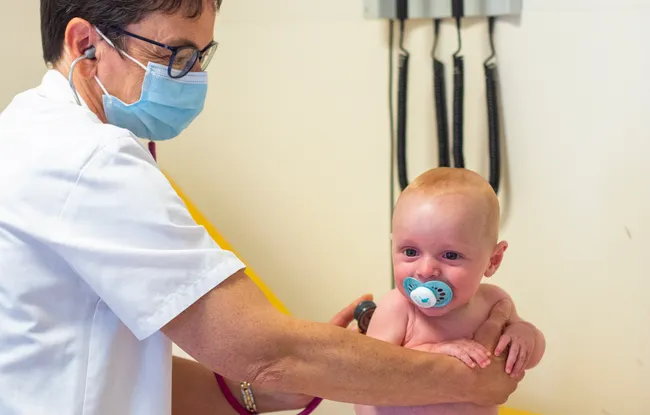- Home
Nephroblastoma and other pediatric renal tumors

Treatment of pediatric renal tumors
Pediatric kidney tumors are very different from adult kidney cancers. Treatment of children with pediatric renal tumors is effective, and the recovery rate is now over 90% at five years.
The treatment of pediatric kidney tumors is carried out by Institut Curie's expert cancer center specifically for young patients: SIREDO (Care, Innovation & Research in Childhood, Adolescent and Young-Adult Oncology).
At Institut Curie, children are cared for in a multidisciplinary setting (pediatric oncologists, surgeons, radiation oncologists, etc.) in compliance with the protocols and recommendations of the Société Française de lutte contre les cancers et Les leucémies de l'Enfant et de l'adolescent (SFCE). The institute follows the therapeutic strategy established on the basis of studies carried out by the International Society of Pediatric Oncology (SIOP).
The current treatment protocol for pediatric kidney tumors is called UMBRELLA . Led by AP-HM (Marseille University Hospitals), it involves starting with preoperative chemotherapy to shrink the tumor before surgery. Tissues removed during surgery are examined by anatomopathologists, to adapt future treatment.
Preoperative chemotherapy for nephroblastoma and pediatric renal tumors
If radiologists confirm that the tumor in a child aged between six months and ten years has the typical appearance of nephroblastoma, with no abnormalities in nearby lymph nodes and no distant metastases, treatment begins with preoperative chemotherapy. This treatment lasts four to six weeks and is based on two drugs (vincristine and actinomycin), or three if metastases are present (adding doxorubicin). The goal is to shrink the kidney tumor so that surgery can be performed under the best possible conditions.
Surgery for nephroblastoma and pediatric renal tumors
Following preoperative chemotherapy, an imaging examination is carried out in preparation for surgery. This involves removal of the tumor and usually the entire kidney (total nephrectomy). The child can then live a completely normal life with just one kidney. In rare cases, for example if the disease affects both kidneys, partial removal of the kidney is discussed at a multidisciplinary consultation meeting (RCP) between surgeons, radiologists and oncologists.
In newborns and infants, if the tumor is small and operable, there may be an indication for immediate surgery without prior chemotherapy.
Institut Curie collaborates with the pediatric hospitals of the AP-HP to perform kidney tumor surgery. Their experienced surgeons are experts in these operations on the kidneys of young children.
Resected kidney tumors are analyzed histopathologically to determine the extent of the tumor - stage 1 (local), stages 2 and 3 (intermediate risk) or stage 4 (with the presence of distant metastases) - as well as its histological type and subtype (low-risk, intermediate-risk or high-risk Wilms tumor, or other kidney tumor). This information guides postoperative management: observation, shorter or longer chemotherapy, radiotherapy.
Post-operative chemotherapy for nephroblastoma and pediatric renal tumors
If the tumor is stage 1, chemotherapy is based on vincristine and actinomycin to eliminate the remaining cancer cells. It lasts four weeks.
For stages 2 or 3, chemotherapy is spread over 28 weeks with the same two drugs, or with the addition of doxorubicin.
In stage 4 disease with lung metastases, treatment can last up to 35 weeks (about seven months) and involves stronger drugs such as carboplatin and cyclophosphamide.
Radiotherapy of nephroblastoma and pediatric renal tumors
The treatment of kidney tumors may also require outpatient radiotherapy sessions lasting two to three weeks, to eliminate any remaining cancer cells in affected children. Radiation oncologists at Institut Curie specialize in radiotherapy for kidney tumors, the renal bed (where the kidney was removed), or the lungs in case of metastases. They pay particular attention to the follow-up of their young patients, both during and after radiotherapy.
Targeted therapies and immunotherapy for nephroblastoma and pediatric renal tumors
The aim of targeted therapies is to block the function of a gene or part of a chromosome in a very specific way. In the present case, these are tyrosine kinase inhibitors that act on tumor vascularization in particular.
Immunotherapy aims to stimulate the young patient's immune system to fight the cancer. These approaches may be used to treat certain kidney tumors, such as clear cell sarcoma or renal carcinoma.
Oncogenetics in nephroblastoma and pediatric renal tumors
Because certain syndromes predispose to nephroblastoma, Institut Curie arranges consultations with a genetic counselor to inform parents. It also offers genetic testing for children with kidney tumors, if geneticists consider it relevant.

